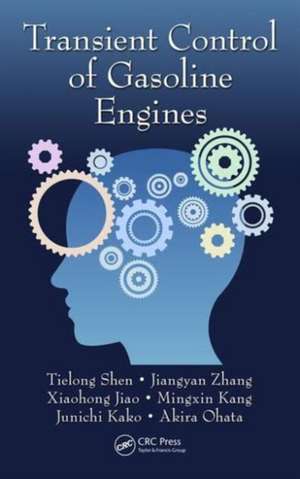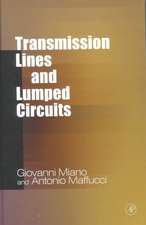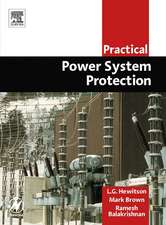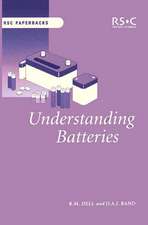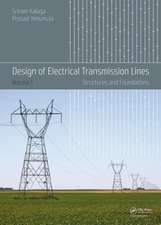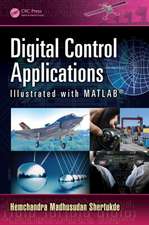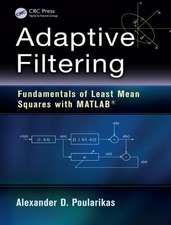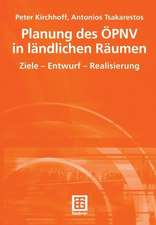Transient Control of Gasoline Engines
Autor Tielong Shen, Jiangyan Zhang, Xiaohong Jiao, Mingxin Kang, Junichi Kako, Akira Ohataen Limba Engleză Hardback – 4 noi 2015
Dedicated to improving the emissions of automotive powertrains, it provides an introduction to modeling, control design, and test bench, and explains the fundamentals of modeling and control design for engine transient operation. It also presents a model-based transient control design methodology from the perspective of the dynamical system control theory.
Written with graduate students in mind, this book:
- Addresses issues relevant to transient operation, cycle-to-cycle transient, and cylinder-to-cylinder balancing
- Examines the real-time optimizing control problem (receding horizon optimization, for torque tracking control and speed control)
- Covers three benchmark problems related to the modeling and control of gasoline engines: engine start control, identification of the engines, and the boundary modeling and extreme condition control
| Toate formatele și edițiile | Preț | Express |
|---|---|---|
| Paperback (1) | 341.42 lei 6-8 săpt. | |
| CRC Press – 31 ian 2024 | 341.42 lei 6-8 săpt. | |
| Hardback (1) | 905.82 lei 6-8 săpt. | |
| CRC Press – 4 noi 2015 | 905.82 lei 6-8 săpt. |
Preț: 905.82 lei
Preț vechi: 1141.89 lei
-21% Nou
Puncte Express: 1359
Preț estimativ în valută:
173.35€ • 180.60$ • 144.13£
173.35€ • 180.60$ • 144.13£
Carte tipărită la comandă
Livrare economică 11-25 februarie 25
Preluare comenzi: 021 569.72.76
Specificații
ISBN-13: 9781466584266
ISBN-10: 1466584262
Pagini: 324
Ilustrații: 160 black & white illustrations
Dimensiuni: 156 x 234 x 23 mm
Greutate: 0.59 kg
Ediția:1
Editura: CRC Press
Colecția CRC Press
ISBN-10: 1466584262
Pagini: 324
Ilustrații: 160 black & white illustrations
Dimensiuni: 156 x 234 x 23 mm
Greutate: 0.59 kg
Ediția:1
Editura: CRC Press
Colecția CRC Press
Public țintă
GeneralCuprins
Introduction. Mathematical Model of Gasoline Engines. Speed Control. Air–Fuel Ratio Control. Receding Horizon Optimal Control. Balancing Control. Residual Gas and Stochastic Control. Benchmark Problems for Control and Modeling of Automotive Gasoline Engine. Bibliography.
Notă biografică
Tielong Shen earned his PhD in mechanical engineering from Sophia University, Tokyo, Japan. Since April 1992, he has been a faculty member and the chair of control engineering in the Department of Mechanical Engineering, Sophia University, where he currently serves as a professor. Since 2005, he has also served as "Luojia Xuezhe" Chair Professor of Wuhan University, China. His research interests include control theory and applications in mechanical systems, powertrain, and automotive systems. He has authored and coauthored numerous articles and books and serves as a member of the IEEE Technical Committee and IFAC Technical Committee on Automotive Control.
Jiangyan Zhang received B.E. and M.E. degrees in Electrical Engineering from Yanshan University, Qinhuangdao, China, in 2005 and 2008, respectively, and a Ph.D. degree in Mechanical Engineering from Sophia University, Tokyo, Japan, in 2011. From April 2011 to March 2013, she was a Post-Doctoral Research Fellow at SHEN Laboratory of Sophia University, and currently is an assistant professor with the College of Electromechanical and Information Engineering of Dalian Nationalities University, China. Her research interests are mainly in nonlinear dynamical control theory and application to the automotive powertrain systems.
Xiaohong Jiao earned her PhD in mechanical engineering from Sophia University, Tokyo, Japan, in 2004. She is a professor with the Institute of Electrical Engineering, Yanshan University, Qinhuangdao, China. Her current research interests include robust adaptive control of nonlinear systems and time-delay systems and applications to hybrid distributed generation systems and automotive powertrain.
Mingxin Kang earned his PhD in mechanical engineering from Sophia University, Tokyo, Japan, in 2015. For the past three years, he has applied himself to the study of engine transient control and real-time optimization control theory. His main contributions include the transient control scheme development for the engine in-the-loop simulation system and nonlinear receding horizon optimal control for the gasoline engine control system. He currently serves as a postdoctoral research fellow at Sophia University. His current research interests include automotive energy optimization and nonlinear optimal control for the engine system.
Junichi Kako received a B.E. degree from Nagoya Institute of Technology, Japan. He joined Toyota Motor Corporation, Japan in 1989. He worked on various aspects of automotive powertrain control. From 1989 to 1994, he was part of the team for the development of Laboratory Automation (LA) system, Engineering Office Automation (EOD) system, and embedded system of powertrain control. During 1995-2001, he focused on the engine control systems in Powertrain Management Engineering Division. In 2002, he was with Future Project Division in which he was responsible for the R&D of model-based engine control system. Currently, he is developing engine control systems in the Advanced Engine Management System Development Division, Toyota Motor Corporation.
Akira Ohata graduated from Tokyo Institute of Technology in 1973 and directly joined Toyota Motor Corporation. He was involved in exhaust gas emission controls, intake and exhaust system developments including variable intake systems, hybrid vehicle control system, vehicle controls, Model-Based Development (MBD), and the education of advanced control theory at Toyota. He has the standardization activity in Object Management Group (OMG) assuring dependability of consumer devices. His current major interest is modeling that includes model simplification and the integration of physical and empirical models. He is a senior general manager of Toyota Motor Corporation, a vice chair of IFAC TC7.1 (automotive control), a research fellow of Information Technology Agency (IPA) under the Ministry of Economy, Trade, and Industry, and the chair of technical committee on plant modeling of SICE (Society of Instrument and Control Engineers). He received the most outstanding paper award in convergence in 2004 and technical contribution award from JSAE.
Jiangyan Zhang received B.E. and M.E. degrees in Electrical Engineering from Yanshan University, Qinhuangdao, China, in 2005 and 2008, respectively, and a Ph.D. degree in Mechanical Engineering from Sophia University, Tokyo, Japan, in 2011. From April 2011 to March 2013, she was a Post-Doctoral Research Fellow at SHEN Laboratory of Sophia University, and currently is an assistant professor with the College of Electromechanical and Information Engineering of Dalian Nationalities University, China. Her research interests are mainly in nonlinear dynamical control theory and application to the automotive powertrain systems.
Xiaohong Jiao earned her PhD in mechanical engineering from Sophia University, Tokyo, Japan, in 2004. She is a professor with the Institute of Electrical Engineering, Yanshan University, Qinhuangdao, China. Her current research interests include robust adaptive control of nonlinear systems and time-delay systems and applications to hybrid distributed generation systems and automotive powertrain.
Mingxin Kang earned his PhD in mechanical engineering from Sophia University, Tokyo, Japan, in 2015. For the past three years, he has applied himself to the study of engine transient control and real-time optimization control theory. His main contributions include the transient control scheme development for the engine in-the-loop simulation system and nonlinear receding horizon optimal control for the gasoline engine control system. He currently serves as a postdoctoral research fellow at Sophia University. His current research interests include automotive energy optimization and nonlinear optimal control for the engine system.
Junichi Kako received a B.E. degree from Nagoya Institute of Technology, Japan. He joined Toyota Motor Corporation, Japan in 1989. He worked on various aspects of automotive powertrain control. From 1989 to 1994, he was part of the team for the development of Laboratory Automation (LA) system, Engineering Office Automation (EOD) system, and embedded system of powertrain control. During 1995-2001, he focused on the engine control systems in Powertrain Management Engineering Division. In 2002, he was with Future Project Division in which he was responsible for the R&D of model-based engine control system. Currently, he is developing engine control systems in the Advanced Engine Management System Development Division, Toyota Motor Corporation.
Akira Ohata graduated from Tokyo Institute of Technology in 1973 and directly joined Toyota Motor Corporation. He was involved in exhaust gas emission controls, intake and exhaust system developments including variable intake systems, hybrid vehicle control system, vehicle controls, Model-Based Development (MBD), and the education of advanced control theory at Toyota. He has the standardization activity in Object Management Group (OMG) assuring dependability of consumer devices. His current major interest is modeling that includes model simplification and the integration of physical and empirical models. He is a senior general manager of Toyota Motor Corporation, a vice chair of IFAC TC7.1 (automotive control), a research fellow of Information Technology Agency (IPA) under the Ministry of Economy, Trade, and Industry, and the chair of technical committee on plant modeling of SICE (Society of Instrument and Control Engineers). He received the most outstanding paper award in convergence in 2004 and technical contribution award from JSAE.
Descriere
Car electronics and digital processing technology have been used to improve the efficiency and performance of engines for decades, yet the main focus is still on static or pseudo-static mode, while the engines loaded in the road vehicles are not always operated at static mode. This book describes the behavior of engine dynamics operated at transient mode as a dynamical system, and uses advanced control theory to design a real-time control strategy that can be used to improve efficiency and emission performance.
